
Quora Keyword Research – The Definitive Guide
One of the biggest problems facing content creators is the content written is not good enough (some content marketers equate that to poor content).
Poor content usually happens when content writers fail to write useful stuff for their target audience.
Put in bluntly, the content is not ideal for the audience.
More...
Neil Patel, one of the best and successful content marketers in the world, has this to say in his article in Content Marketing Institute.
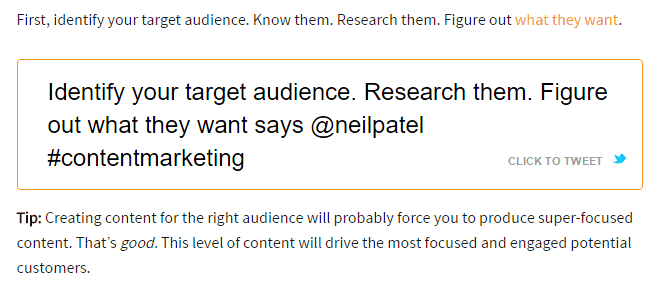
Neil Patel: Founder of Quicksprout, NeilPatel.com, co-founder of CrazyEgg, Kissmetric, Hello Bar
Creator: 9 Mistakes You Might Be Making With Your Content Marketing Strategy
So how do you identify, research and get to know your target audience so as to create content that is useful and meet their needs?
One of the best ways is first to get content ideas by crowd-sourcing through online communities.
In recent years, Questions & Answers web sites are popular with content creators. Below are the better known sites which are proven to be useful to content marketers in getting content ideas or ask questions and get answers:
- Reddit (Click here for a detailed Reddit Keyword Research guide for online entrepreneurs)
- Quora
- Yahoo!Answers
- Stack Exchange
- Answers.com
- AnswerThePublic
- FoxFAQ
In this guide I would be digging deep into exploring how to use Quora as an almost limitless source of content ideation.
I would divide the guide into two main parts. The goal of this guide is to help you to be a content miner using Quora. With this in mind, you need to understand two aspects
- Mining ideas from Quora - qualitative analysis
- Quora keyword research - quantitative analysis
PART 1 will be all about Quora with heavy emphasis on how to mine untapped content ideas. If you are a seasoned user of Quora, it might just be old news to you. Nevertheless, it is still a good idea to know the nitty-gritty of Quora and as a checklist you can refer to when using Quora.
Click here to skip to Part 1: Mining Ideas From Quora - Qualitative Analysis
Part 2 will be all about turning these content ideas into (hopefully) rankable keywords. It is not theory alone. It is a step-by-step methodology on how to find low competition long tail keywords.
Click here to skip to Part 2: Quora Keyword Research - Quantitative Analysis
Part One: Mining Ideas From Quora - Qualitative Analysis
What is Quora?
The simplest answer from Quora is
“Quora is a place where you can ask questions you care about and get answers that are amazing.”
There are several answers from Quora itself, including this from one of its founders, Adam D’Angelo here
A more academic answer from Wikipedia is as below.

What is Quora? - Definition from Wikipedia
Let’s summarize it here.
Quora is a Q&A web-based site (a website which follows a question-and-answer format) in which questions are asked and answered, edited and organized through collaboration by its registered users.
Why is Quora important to content marketers?
In March 2016 Quora, through its founder Adam D’Angelo, said that Quora had 100 million monthly unique visitors.
Let’s look at the traffic statistics on Quora.
According to data from Alexa, Reddit ranked 161 globally and 69 in US.
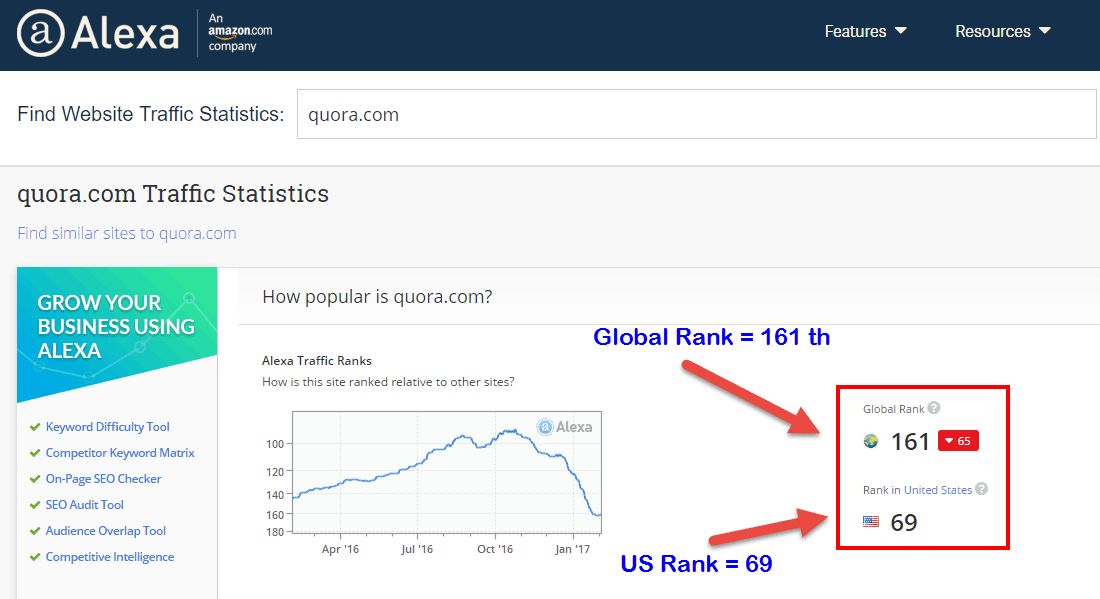
How popular is Quora? (Source: Alexa.com)

Traffic Overview of Quora - Similarweb
Quora is the number 2 Reference site (after Wikipedia) in the world.
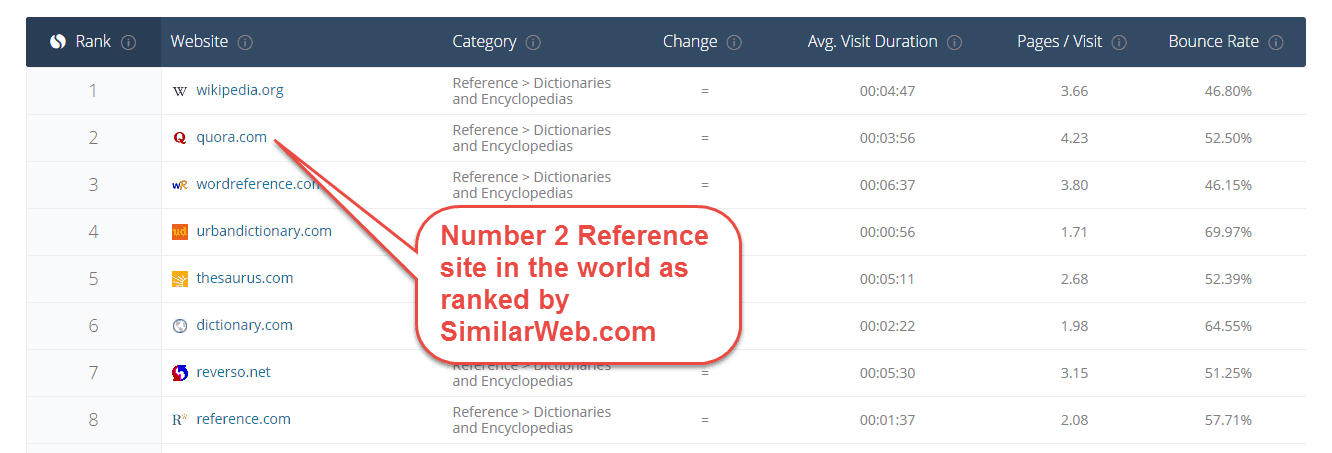
Number 2 Reference site by Similarweb
By leveraging on the huge traffic of visitors to Quora, marketers could reap two main benefits.
- Benefit #1 By active and clever participation in the user-generated communities within Quora, marketers could potentially drive an insane amount of traffic to their business or websites
- Benefit #2 By using the proper methodology and suitable keyword research tools, content marketers will find that Quora is indeed a goldmine of content ideas and keywords
I am not going into the nitty-gritty on how to use Quora as a marketing tool (first benefit). You may refer to the following guides for further reading:
Recommended readings:
1. Beginner’s Guide to Quora: The Most Helpful Uses for Marketers by Kevan Lee from Buffer
2. The Most Bad Ass Guide To Quora Marketing by Ahfaz Ahmed
3. Quora for Business: The Complete Guide for Business Owners and Marketers by Steve Shaw
My focus in this guide will be exploring the second benefit, i.e. using Quora to uncover content ideas for your next content marketing material.
And then use some simple step-by-step keyword research techniques to find long tail keywords in no time.
With this in mind, are you ready to follow me to go deep into Quora now?
Why is Quora an ideal platform to uncover hidden gems for content ideation?
There are several important features inside Quora that make Quora an ideal place for mining content ideas:
- Quora has good quality content on a diverse but balanced scope of topics (you may want to have a quick look at all the topics at https://www.quora.com/sitemap and https://www.quora.com/sitemap/alphabetical_topics/all
- It is like a search engine where you can search specific question on specific topic. There are over 300,000 topics categorized by relevancy
- Most questions are useful and moderated. Very often they are answered by experts in their respective field
- It also has a down voting /up voting system by its huge community base which means active user participation
- Quora allows your question be channeled to specific users via A2A (Ask To Answer feature)
- Quora blogging - blogs in Quora are quite specific in nature
Let us see how Quora can be used for getting content ideas and for content creation. But first we must dissect the Quora website.
Method 1: Turn A Question Into An Article
One classic example is by turning a question into an article such as this one:
Question posted on Quora: What are some Google search tips and hacks?
Article written on Buzzfeed: 21 Google Search Hacks That Will Change Your Life
What the author in Buzzfeed did was creating an article by “borrowing” the ideas and answers in the Quora thread.
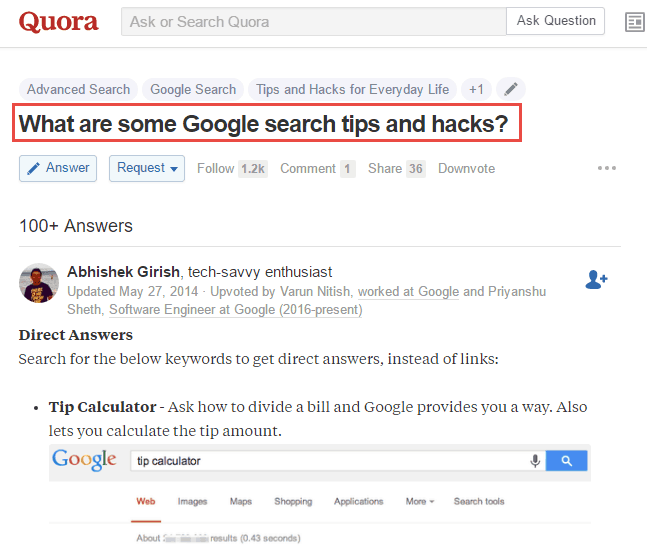
Question asked - Google search tips and hacks
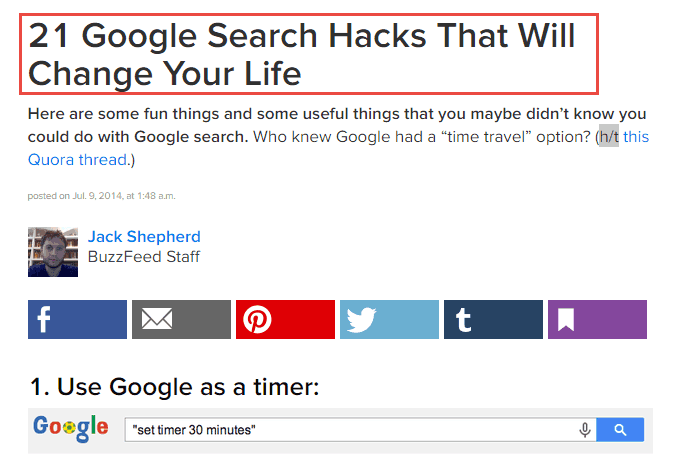
Buzzfeed article based on Q&A in Quora
This is the simplest way of getting an idea by just looking at a question asked in Quora.
In this method you just need to do a site search in Google using the following search string:
After that just head over to Quora to view the thread with that question. See below for our example.

"Google search and tips" is the keyword
Method 2: Research “Topics” For Content Creation
This method is useful to for an in-depth qualitative research on a particular topic of your choice.
Step #2

Go to Quora (register or log in)
Step #2
In the following example I am going to put in a broad topic called “content marketing”. Here is how it looks in the drop down menu.
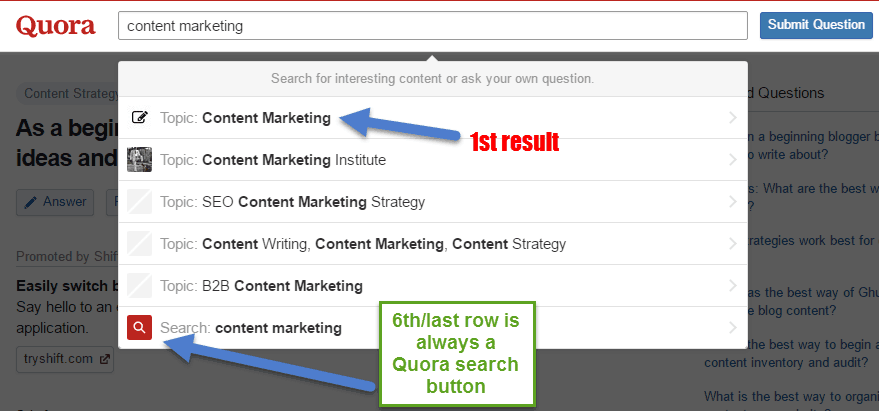
content marketing topic
Then I choose the first result “Content Marketing” and it brings me to the topic page where you can see four tabs: Read, Answer, Topic FAQ, Most Viewed Writers.
The Read tab is the default page where you see the Feed of a list of Qs & As
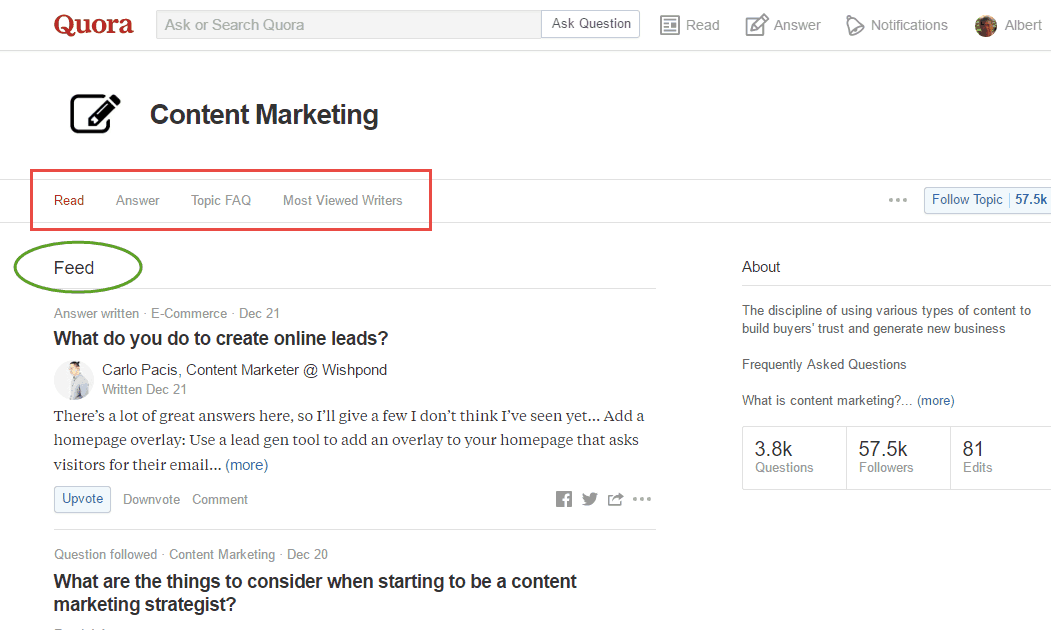
Quora Feed
If you click the Topic FAQ tab, you will see a list of FAQs by Quora community.
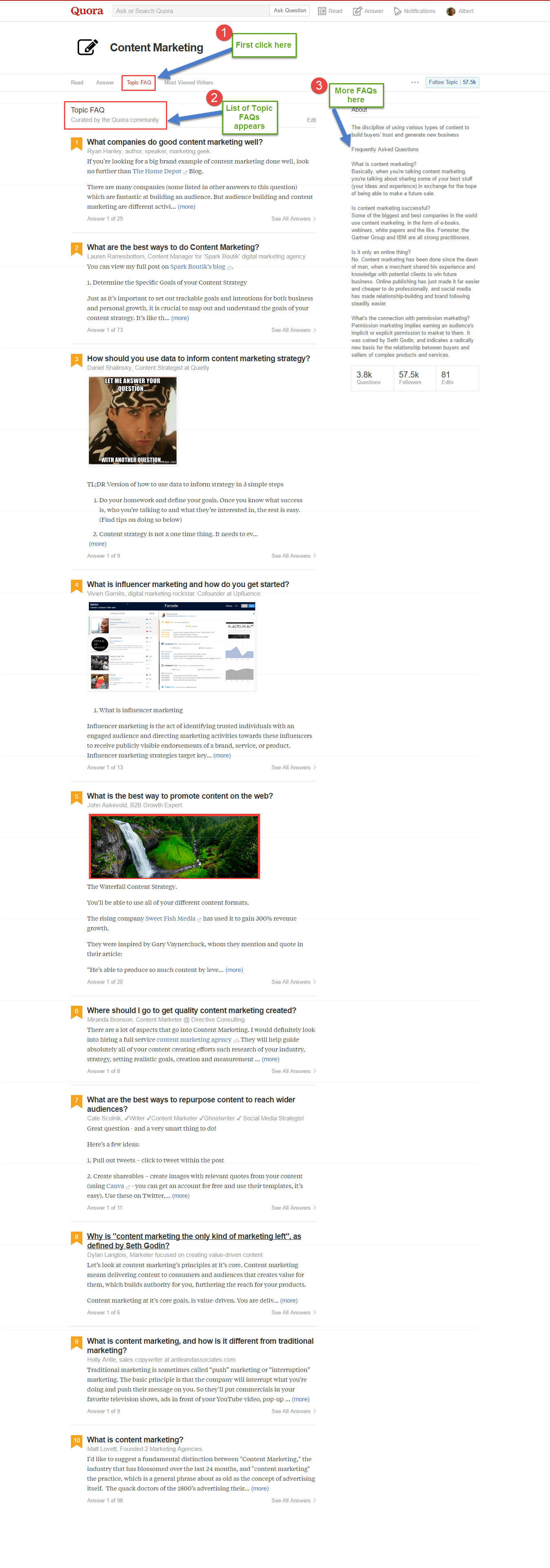
Topic FAQ and FAQ
You should click the Most Viewed Writers tab to see the top writers with the most answer views in the last 30 days.
On the right you can see the Top Questions asked for the topic “content marketing”
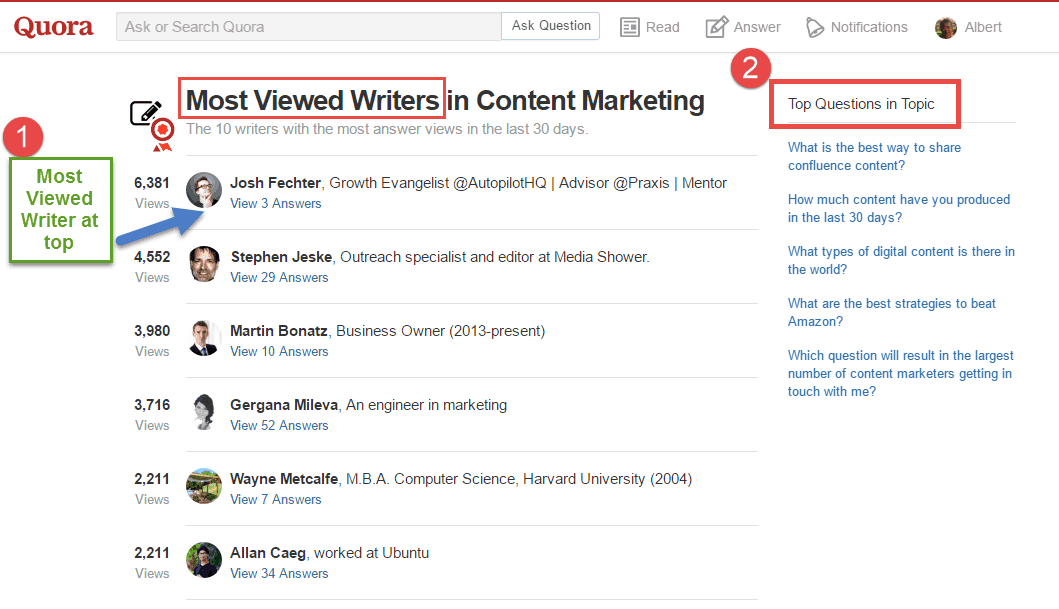
most viewed writers at the top
Step #2
All you have to do is spend some time to go through the content in those 3 tabs as stated in Step #2.2.
Generally, you would like to look for Questions which have
- more views
- more upvotes
- more followers
- been answered by Most Viewed Writers
These questions are definitely the more popular ones. I’m sure you will find tons of content ideas for your chosen topic.
Method 2 will be useful when there are already some “Topics” in Quora. Usually there are 5 suggested “Topics” which Quora thinks is related to what you are searching. (Hint: similar to Google Related search)
The sixth row is always a search on the keyword you have input in the search box. Clicking through it will bring up a results page. See below screen shot.
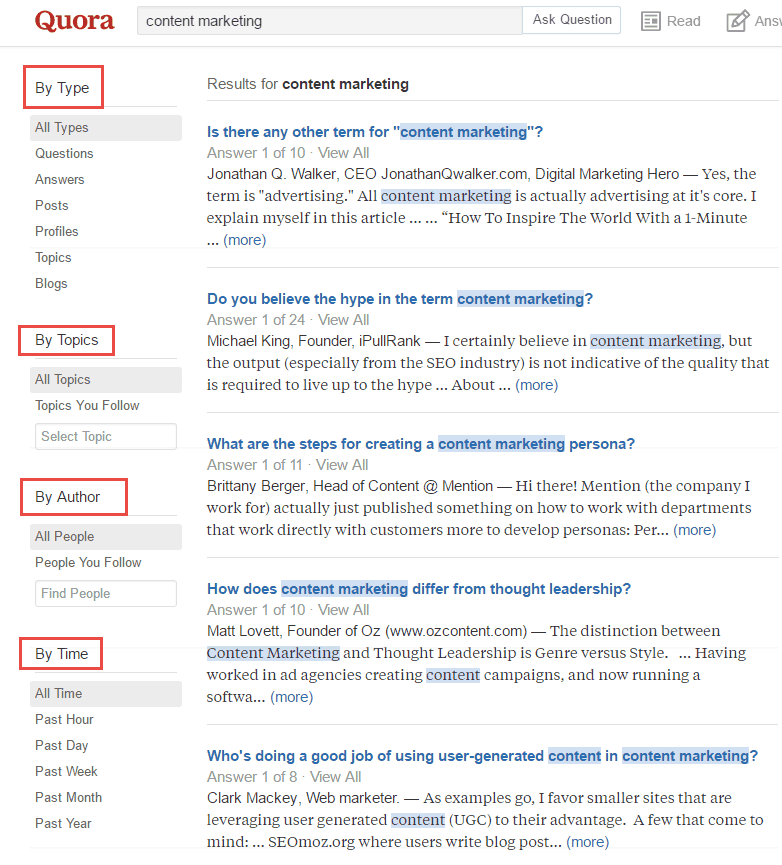
6th row search results
In this page you have the options to filter the results by Type, Topics. Author and Time.
By now you should be able to see the power of Quora in categorizing the questions and answers in a systematic way, just like a search engine.
Method 3: Searching Content Using Keyword
This is the same procedure as Method 2, except that sometimes the topic or keyword you put at the search box does not return some established “Topics” in Quora.
In such case, only 5 related or similar questions containing the keyword will be displayed. As usual the 6th row is a search results link for the keyword.
Let’s see what happens if I put “content marketing ideas” as the keyword in the search box in Quora.

"content marketing ideas" drop down menu
Method 4: Deep Searching Content Using Modifiers
It is a good idea to try inputting some extra keywords (called modifiers) in front or behind the initial “topic or keyword”, for example:
modifier + [topic or keyword]
[topic or keyword] + modifier
You won’t be surprised the results (suggested questions by Quora) in the drop down menu are not exactly the same. Look at the 5th question in both screenshots below. The answers are different.
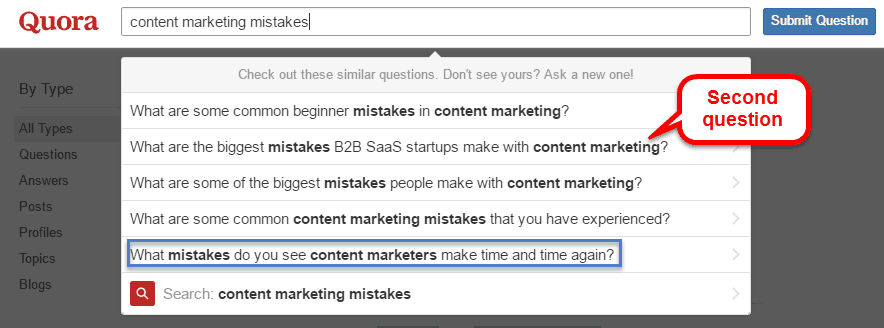
Search "content marketing mistakes"
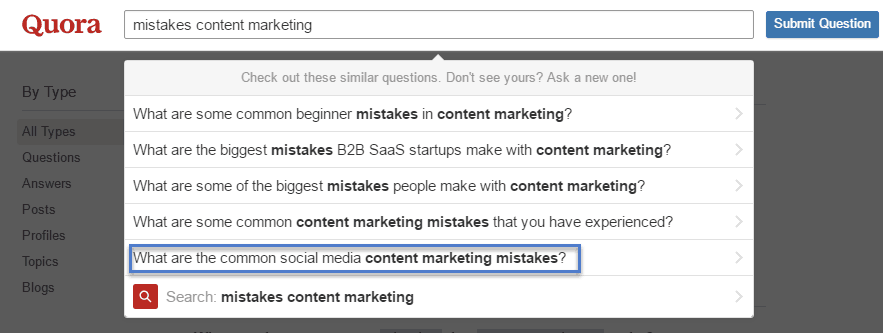
Search "mistakes content marketing"
So it is important to use our imagination when searching using Quora. Experiment using different modifiers and see what results will come out.
Method 5: More Related Questions
Using the above “content marketing mistakes” example by clicking the second question.
“What are the biggest mistakes B2B SaaS startups make with content marketing?” bring us to the below results page.
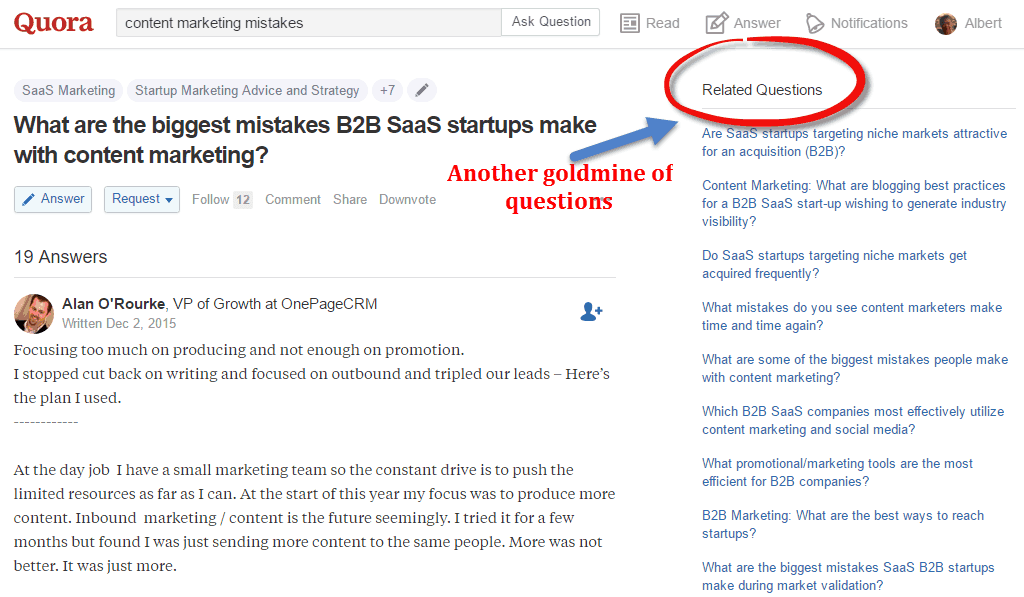
Related Questions to "content marketing mistakes"
Look at the right hand side of the results page, you could see more Related Questions to the original question. Another goldmine of questions!
In fact, this Related Questions listing feature will appear whenever you click on a question.
Method 6: Crowd-sourcing content ideas by A2A (Ask To Answer)
This is a very powerful feature if you could not get any satisfactory answers to your question or you simply want to request specific users (with certain expertise) to answer your question.
Let’s see the below example,

Submit question in Quora
Step #6.1 Ask a question in the Quora search box.
This question "What kinds of mistakes content marketer made in Twitter?" is submitted.
Step #6.2 Check whether the suggested questions by Quora are relevant
Step #6.3 Click through the red color search icon [in the last row (6th row)] if the suggested questions are NOT relevant
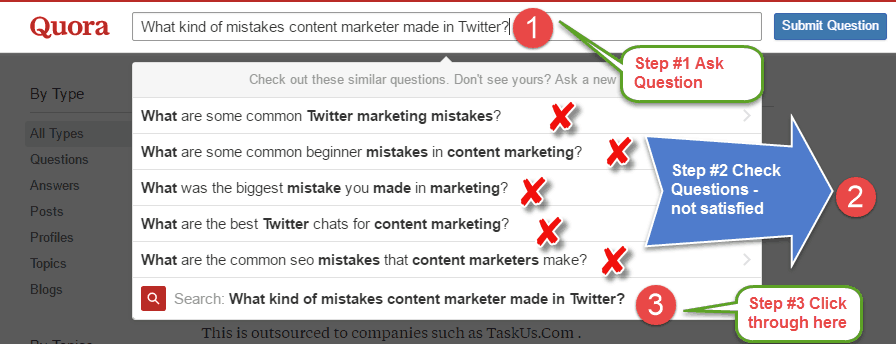
What kind of mistakes content marketer made in Twitter?
Step #6.4 If the questions do not match your search, click the Ask Question icon, followed by the Submit Question to actually ask Quora to find answer.
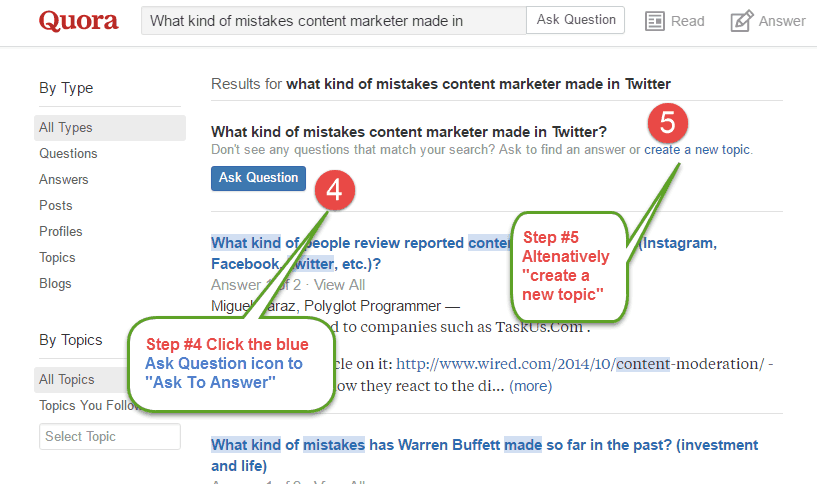
A2A or create a new topic
You have a choice to choose specific user to answer your question by clicking the blue + sign beside the user.
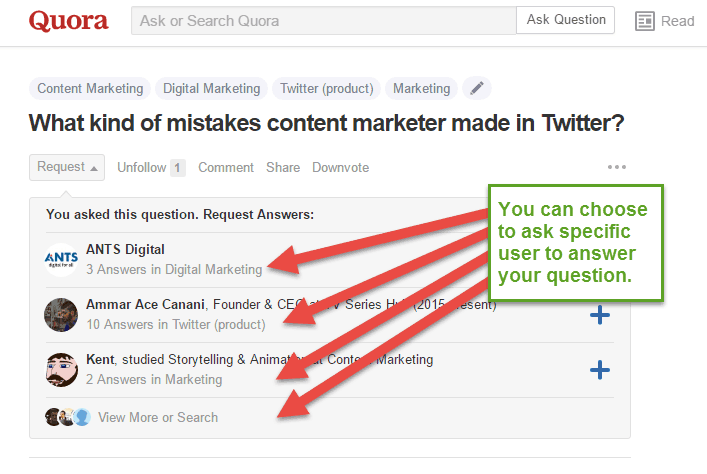
Choose to ask specific user
So by this way you could ask Quora users for their opinion on your question/topic.
Step #6.5 Alternatively you could create a new topic.
Next you will collect the answers, analyze them and make them into your next piece of content!
Here’s an excellent example of how Andrei Petrik used Quora answers to create a full blog post, How LinkedIn Convinced Powerful Influencers to Create Content.

Andrei Petrik Linkedin article
The question he asked in Quora is
How did LinkedIn convince influencers to contribute content?

How did LinkedIn convince influencers to contribute content
And you can view the answers here.
Okay I have covered quite a fair bit on the qualitative part of mining content ideas from Quora.
In the next part of this guide, I would be concentrating on the quantitative part of Quora keyword research. Let's move on there now.
Part Two: Quora Keyword Research - Quantitative Analysis
So we have covered the many qualitative aspects of finding tons of contents ideas from Quora, but are those keywords from the content ideas rankable in Goolge?
What about their monthly search volume? How difficult are they to be ranked in the top of Google?
In the next paragraphs, I would outline a step by step methodology for you to do a complete Quora keyword research.
Using the following example, I am going to demonstrate to you how we can mine (long tail) keywords from Quora.
Next, we generate more keywords (from the original question) and determine their monthly search volume.
Finally, we would determine the ranking difficulty of the keywords we have found.
Let’s dig in.
Assuming you are in the health sub-niche of acne scars. We are looking for content ideas to build a niche site or authority site on this topic.
Step #1 Finding keywords from Quora question
Step #1.1 Type in keyword/topic (acne)
Step #1.2 Select a topic or questions from drop down menu (Topic Acne Scars)
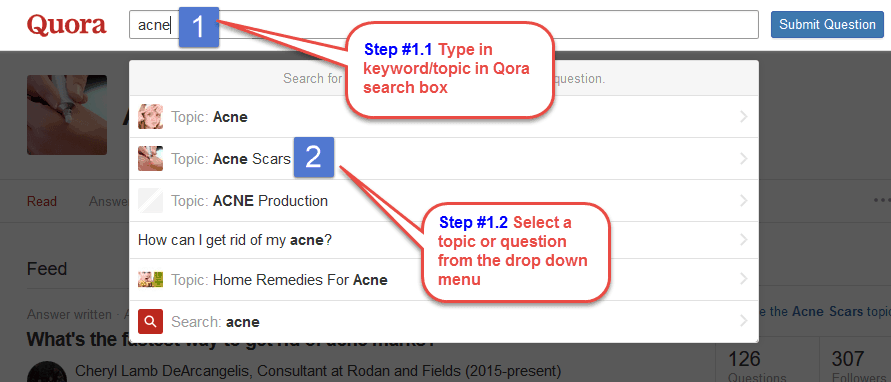
Search "acne"
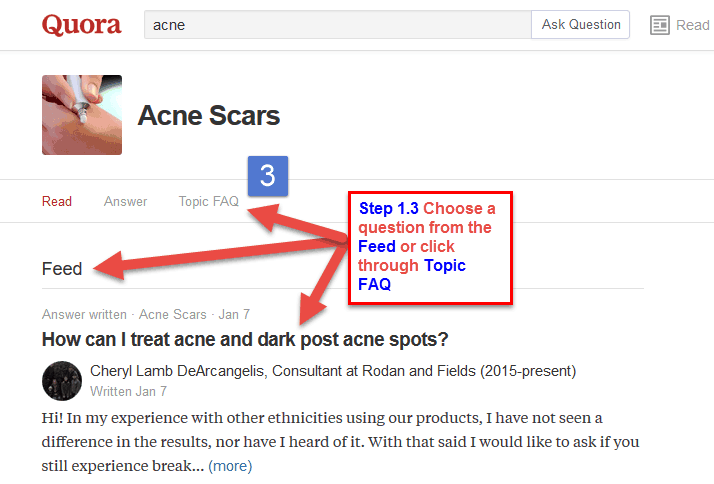
Acne Scars - Feed or Topic FAQ
Step #1.3 Choose a question from Feed or click through Topic FAQ (In our case I choose a question from Feed)

Choose a question
This question was chosen:
What's the fastest way to get rid of acne marks?
Step #2 Analyze the question in Google Adwords Keyword Planner
Copy and paste the question (i.e., What's the fastest way to get rid of acne marks?) into the Google AdWords Keyword Planner. After that click the “Get ideas” button.
Here is the results page for the related keywords for our example:
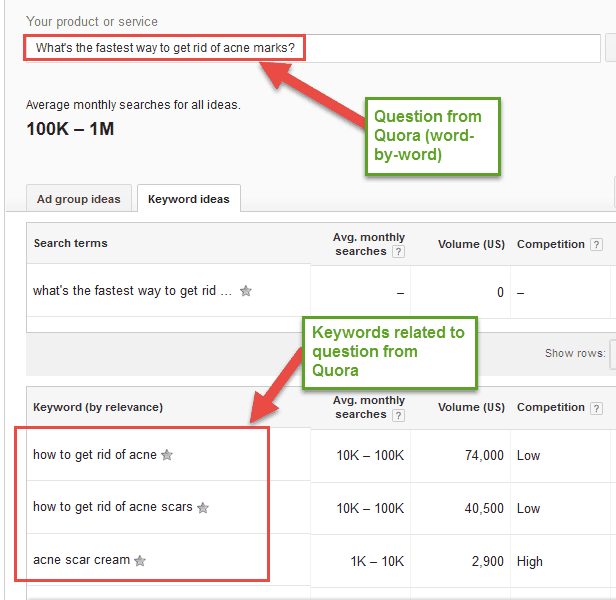
Put question into Google Keyword Planner
From the results page, I have downloaded all the 701 keyword suggestions and picked the following long tail keywords for further analysis.
12 long tail keywords from Google Adwords Keyword Planner |
|---|
how to remove scars |
fastest way to get rid of acne |
how to get rid of back acne scars |
bad acne scars |
how to remove scars from face quickly |
how to lighten acne scars |
how to get rid of acne scars on back |
how to get rid of scars fast |
natural acne scar treatment |
bacne scar removal |
how to remove scars from face |
how to remove marks on face |
Step #3 Keyword Difficulty Analysis
This step is the most important step to determine whether the keywords are rankable in the top pages of Google.
We do this by analyzing the keywords with the top 10 organic results of the SERP in terms of keyword difficulty.
Copy these keywords into Long Tail Platinum (LTP) and Keysearch (KS) separately, first to get the monthly search volume, CPC, advertiser competition, keyword difficulty values as compared to top 10 results (called KC = keyword competitiveness in LTP or Keyword Difficulty Score in Keysearch)

Search results of "acne scars" in Long Tail Pro

Search results of "acne scars" in Keysearch
I have purposely used two paid keyword research tools for keyword difficulty analysis just to make a comparison. Paid tools are used because most free tools will not give provide keyword difficulty data.
Comparison table of Volume (monthly searches) and keyword difficulty level for all the twelve keywords is listed below.
Keyword | Volume (LTP) | Avg KC | Volume (KS) | Score | |
|---|---|---|---|---|---|
| 170 | 32 | 50 | 37 | |
| 480 | 43 | 480 | 54 | |
| 880 | 31 | 880 | 43 | |
| 590 | 30 | 590 | 43 | |
| 1000 | 29 | 1000 | 43 | |
| 590 | 29 | 590 | 40 | |
| 720 | 34 | 590 | 38 | |
| 110 | 30 | 90 | 38 | |
| 1900 | 37 | 1600 | 39 | |
| 390 | 33 | 390 | 42 | |
| 30 | 24 | 140 | 32 | |
| 590 | 32 | 590 | 46 |
The determinant factor whether a keyword is rankable in the top 10 results is keyword difficulty.
You can find more information on the keyword difficulty score of KeySearch here.
As for keyword competitiveness of Long Tail Pro, please go to Recommended KC Targets for Majestic.
You can see that all the twelve keywords except "bad acne scars" are of fairly easy or easy to rank. "Bad acne scars" has a keyword difficulty score of 43 from Long Tail Pro and 54 from Keysearch.
I shall pick one easy to rank keyword for discussion here, i.e."how to remove scars from face quickly". It has a keyword difficulty score of 24 according to Long Tail Pro and 32 from Keysearch.
Let’s go deeper into the top 10 organic results analysis for the keyword.
The screenshot of competitive analysis page for the keyword “how to remove scars from face quickly” from Long Tail Pro is shown below.

Competitive Analysis of keyword "how to remove scars from face quickly" in Long Tail Pro
Look at the KC (average keyword competitiveness) values in the first two columns. You would notice that except for the first, third and fourth sites, all the the sites are having KC values between 20-30. This shows that the keyword is of low competition.
The CF (Citation Flow) and TF (Trust Flow) values at column 3 to 6 indicates that the quantity and quality of the links pointing to the sites are not very high.
Then look at 8th column, Page Referring Domains are also not high, ranging from 19 to 57. Again this tells us that we do not need to build hundreds of quality links in order to rank in page one for this keyword.
You may refer to the following legend for the KC value when evaluating the ranking difficulty.
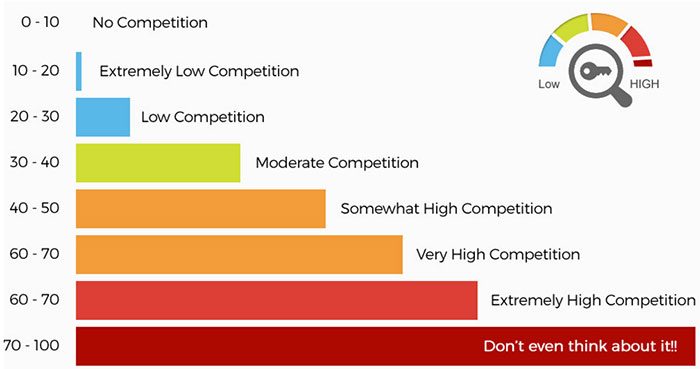
LongTail Pro keyword competitiveness chart
See also below guidelines on Citation Flow and Trust Flow values.
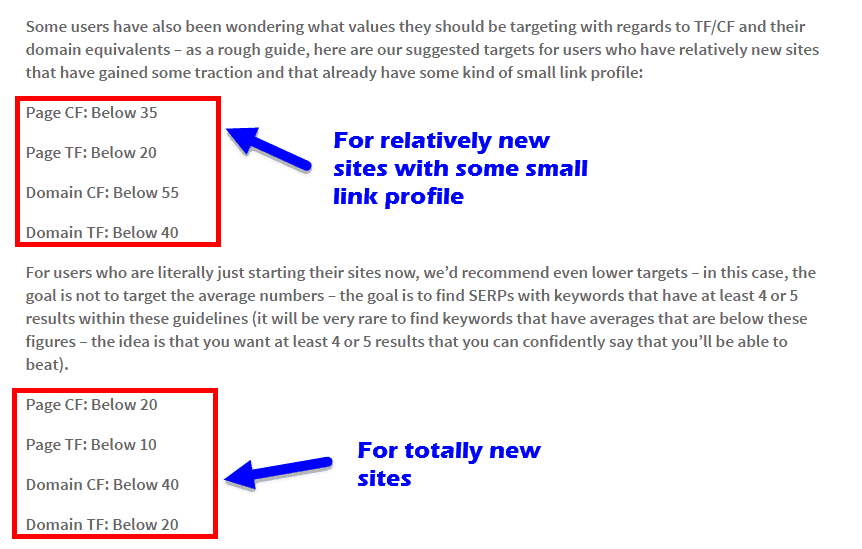
Guidelines on Citation Flow & Trust Flow. (Source:Long Tail Pro)
Results of competitive analysis from Keysearch is as below.

Competitive Analysis of keyword "how to remove scars from face quickly" in Keysearch
Keysearch uses metrics such as Moz Rank (mR), Domain-Level MozRank (DmR), MozTrust (mT), Domain Authority (DA) and Page Authority (PA) obtained from Moz. In Keysearch, page-level Moz Rank is represented by the abbreviation mRank (=mR) while domain-level Moz Rank is mDom (=DmR).
Metrics like PA, DA, mRank, mDom (first 4 columns) in above screenshot show that, except for site #1,3 and 4, most of the top 10 sites are at least fairly easy to outrank.
Fifth column Auth is the number of authority backlinks linking to the page while Links is the total number of backlinks.
The last three columns are on-page metrics: Title, Desc., URL. They will tell whether the keyword is present in the title, description or URL.
For each metric, the color coding in each cell will roughly tell whether it is EASY (green) , MODERATE (yellow) or DIFFICULT (red).
Keysearch is using its own algorithm to combine all the metrics from Moz and summarize it into a single metric called Score. The following is the legend for keyword difficulty level used by Keysearch.
color | color description | difficulty level | difficulty value |
|---|---|---|---|
. | light blue | super easy | 1-20 |
. | light green | fairly easy | 21-30 |
. | dark green | easy-moderate | 31-40 |
. | yellow | moderate | 41-50 |
. | light red | difficult | 51-60 |
. | dark red | very difficult | 61-100 |
Conclusion: Keyword difficulty for keyword “how to remove scars from face quickly” is "easy-moderate" as per Keysearch and "low competition" as per Long Tail Pro. So it is safe to say that this keyword is an easy to rank long tail keyword.
Of course we can do the analysis for the remaining 11 keywords. But we are not going to do this here since the step by step methodology has been followed through in the above example.
Step #4 Find LSI Keywords using a LSI keyword generator
Writing Content For SEO
Now we have got the keywords (including those long tail ones) and their data. Are you going to use all the 701 keywords as churned out by Google Keyword Planner in Step #2 above?
The answer is definitely no because some of the keywords might not be relevant or related to the theme or broad topic of your content.
Some content writers make a big mistake by forcefully putingt all the exact match keywords found in Step #2 into their writing.
This is also a big No-No.
Even though Google bot is a machine, it has acquired knowledge and learned a lot over the years. Google uses system called RankBrain to help filter through its search engine results. It is a kind of machine-learning artificial intelligence.

What is RankBrain? (source:Search Engine Land)
It is very smart nowadays and will penalize any over-optimization of keywords.
One of the important ways to avoid Google ban or penalty is to write naturally by putting your target keywords within your content, without keyword stuffing.
Then sprinkle your content with relevant LSI keywords.
See also a blog post by Neil Patel on "How to Generate Long-Tail Keywords Using Quora and Google Trends"
Brian Dean, one of the top influencers on SEO, said this:


Brian Dean: Founder of Backlinko.com
Creator: Awesome! 16 Powerful SEO Copywriting Secrets (That Work Fast)
But what are LSI keywords by the way?
It is an internet jargon which stands for Latent Semantic Indexing keywords. Read what Quora has to say for LSI keywords.
In layman terms it simply means synonyms or closely related keywords.
Google uses LSI algorithm to determine what a piece of content is all about. So an optimized content laced with LSI keywords would be loved by Google.
How To Find LSI keywords?
There are so many different ways to find LSI keywords. Other than using Google Keyword Planner, Google Search or some other paid tools, my favorite is to use a free tool called LSI Graph.
Step #4.1 Head over to LSI Graph website and enter your keyword (the Quora question)
Step #4.2 Enter the captcha to prove you are not a robot
Step #4.3 Click “GENERATE”
Step #4.4 You would get the results such as below.
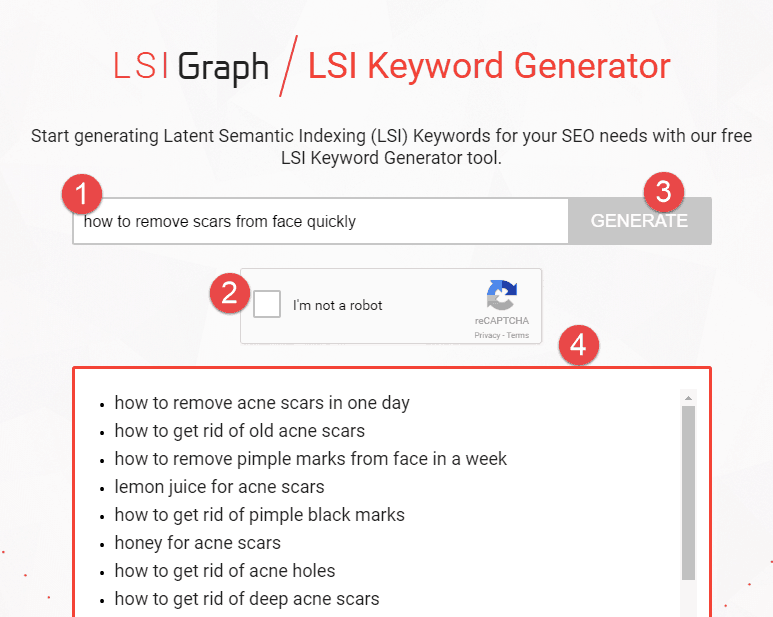
Search using LSI graph
Do you see the gems of LSI keywords generated by this tool? You could actually enter the whole question in the search box instead of short tail keyword.
Pro-tip: Use whole Quora question as "keyword" when search using LSIgraph.com
By using above steps we are able to find good content ideas from Quora qualitatively and quantitatively.
But the last part of the puzzle of creating good content is to make sure the content written is optimized for human consumption, good for SEO and is Google friendly.
Avoid Common Mistakes While Writing Content
- Do not write for Google search engine - write naturally for humans instead
- Do not over-optimize by keyword stuffing - avoid this by sprinkling your content with LSI keywords and variation of keywords
- Do not merely target with keywords - categorize your content with main theme supported by sub-themes (or sub-topics)
For a more in-depth understanding of best practices in SEO copywriting, I would recommend this article.
Recommended reading:
SEO Copywriting: Perrin's System for Maximizing Your Words Per Hour by Perrin Carell from Authority Hacker
Coming back to our Quora question example:
What's the fastest way to get rid of acne marks?
Assuming you have decided to write a blog post of acne scars with emphasis on face acne. In Step #3 above we have already evaluated the keyword “how to remove scars from face quickly” as an easy to rank long tail keyword.
For title, you may come up with following keyword rich titles:
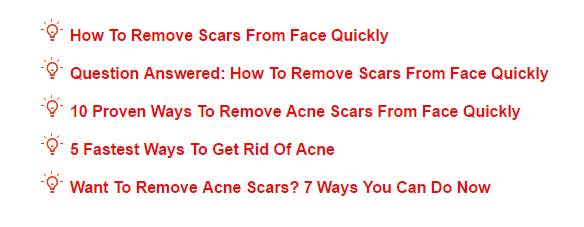
Keyword rich titles for "how to remove scars from face quickly"
Remember to put the target keyword or variation of it in the title and you would be good to go.
Pro-Tip: Use a headline analyzer http://buff.ly/2lp0Skv to improve your title @CoSchedule
This headline analyzer by CoSchedule is easy to use. A good title surely will not only drive traffic but also increase social shares and search rankings.
For the content, research a little further using the the following LSI keywords found earlier. Then use them appropriately in your content. Remember to sprinkle only those relevant ones.
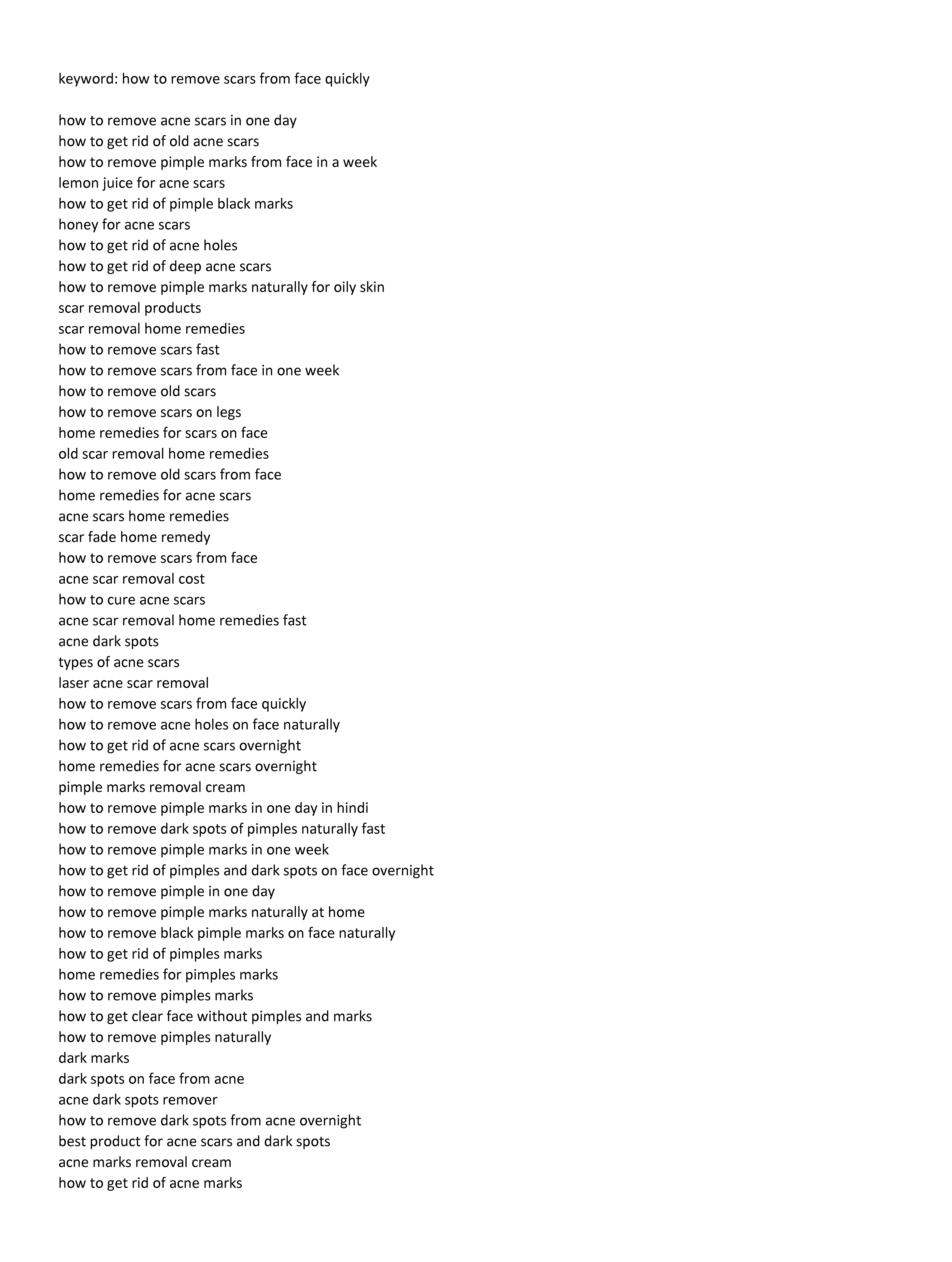
50+ LSI keywords generated from LSIGraph.com
Conclusion
If you hit the writer’s block while creating content, you could turn to Quora to get almost never ending sources of content ideas.
If you are using blogging to drive traffic and leads to your business, you would get tons of blogging ideas by researching Quora using the above methodology.
You can use the various features within Quora to mine real questions asked by real people and their answers.
If you can’t find the right questions and answers, you can then use the A2A (Ask To Answer) feature to crowd-source the opinions of other users in Quora. Many of them are experts in their respective field.
Once you have got the topics or ideas from the Quora community, plug them into the free Google Adwords Keyword Planner to find keywords.
Then analyze the ranking difficulty level of the keywords to choose the right and rankable keywords. You can use Long Tail Pro or Keysearch, two of my favorite tools which are not too expensive.
The last step is to find more LSI keywords by using LSI Graph.
Create an attention grabbing title with the right keywords. Pick and use LSI keywords intelligently in your content and write naturally.
Over To You
I hope you enjoy this definitive guide on Quora keyword research.
What are your thoughts on mining content ideas from Quora? Have you tried it? Would you be using the keyword research techniques outlined above for your next content creation?
Also: check out the keyword research methods above and let me know if you have any questions about implementing them.
Is there anything you'd like to learn about in more details? Kindly let me know in the comment box below.
Follow us
